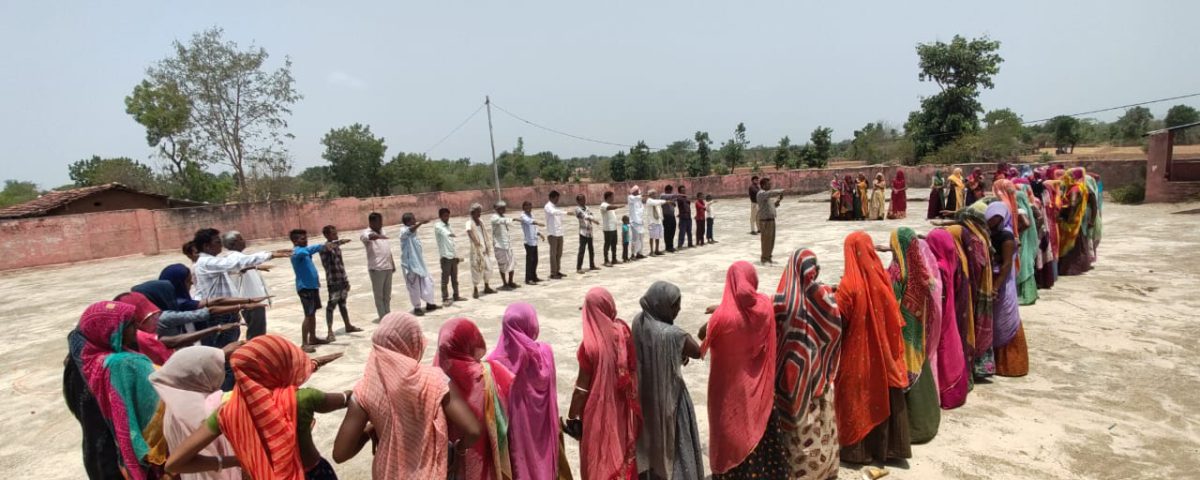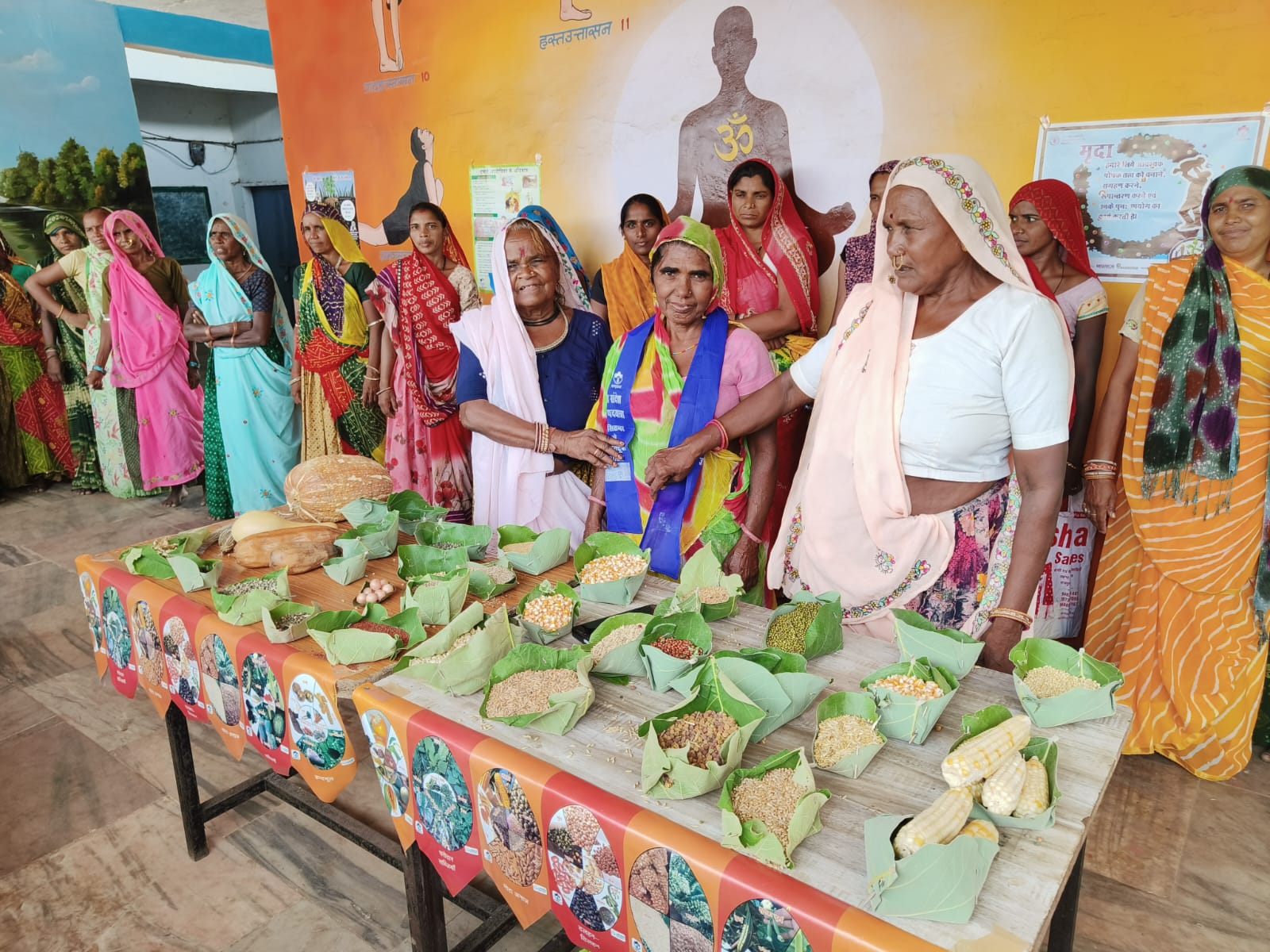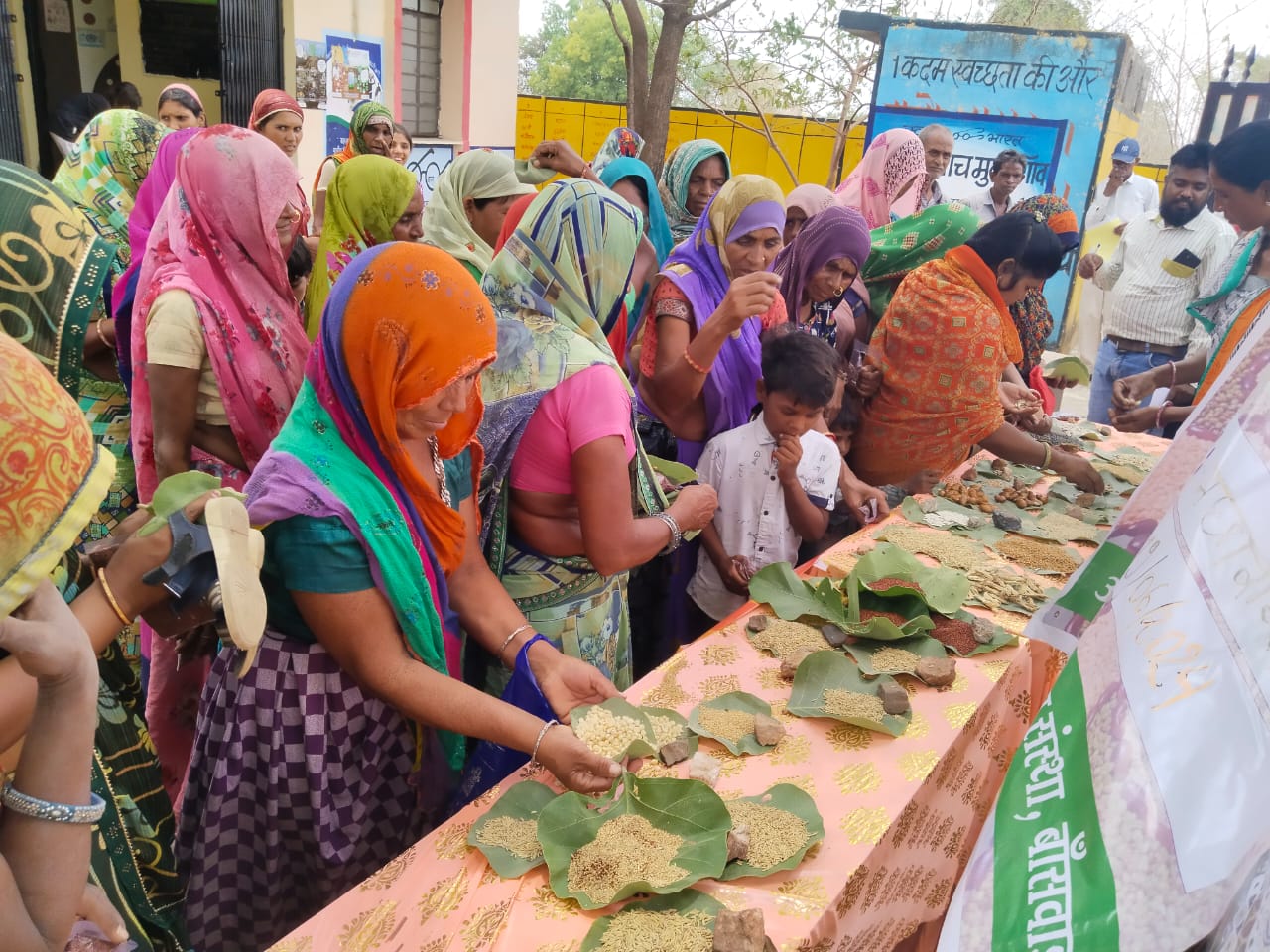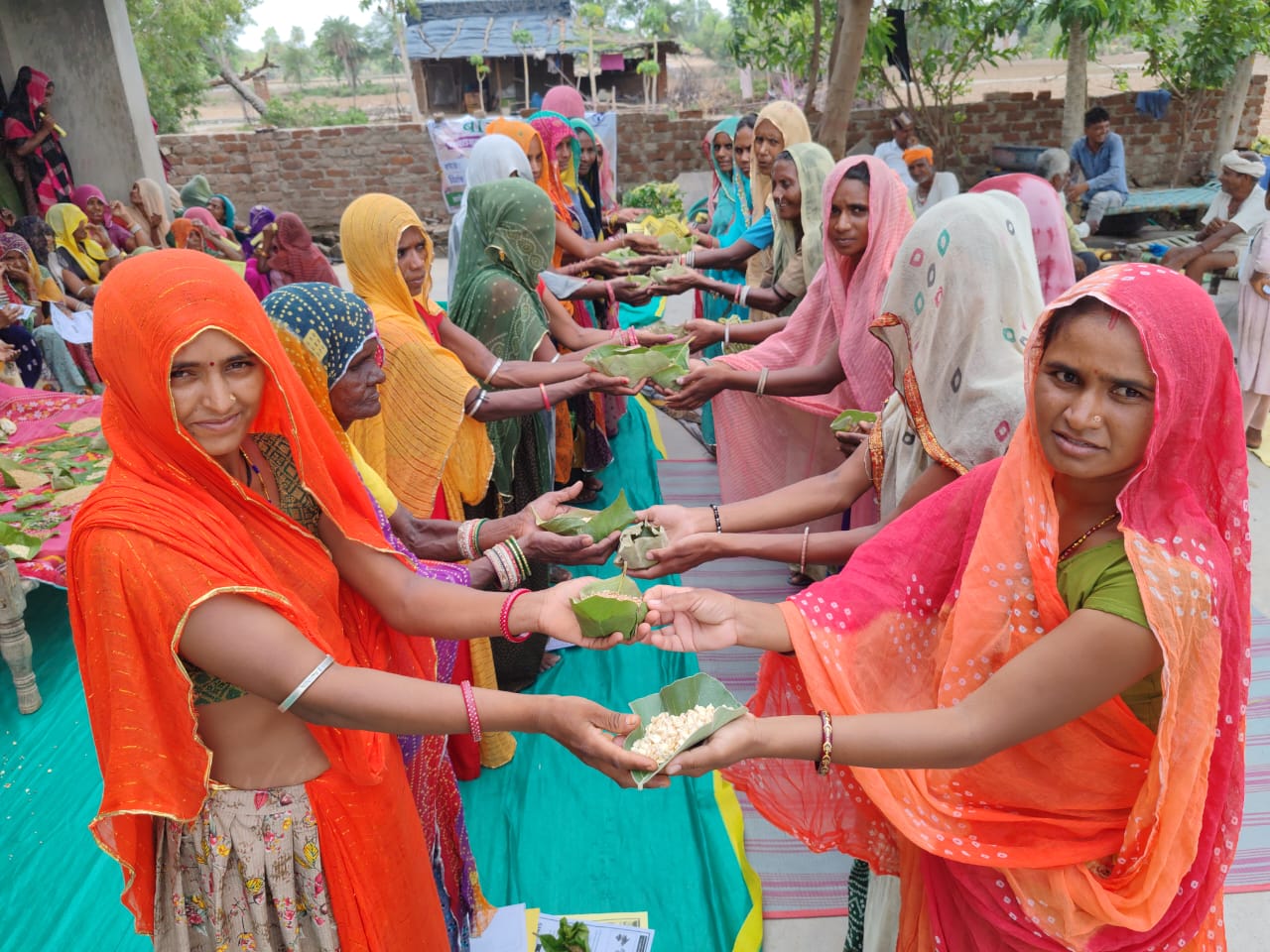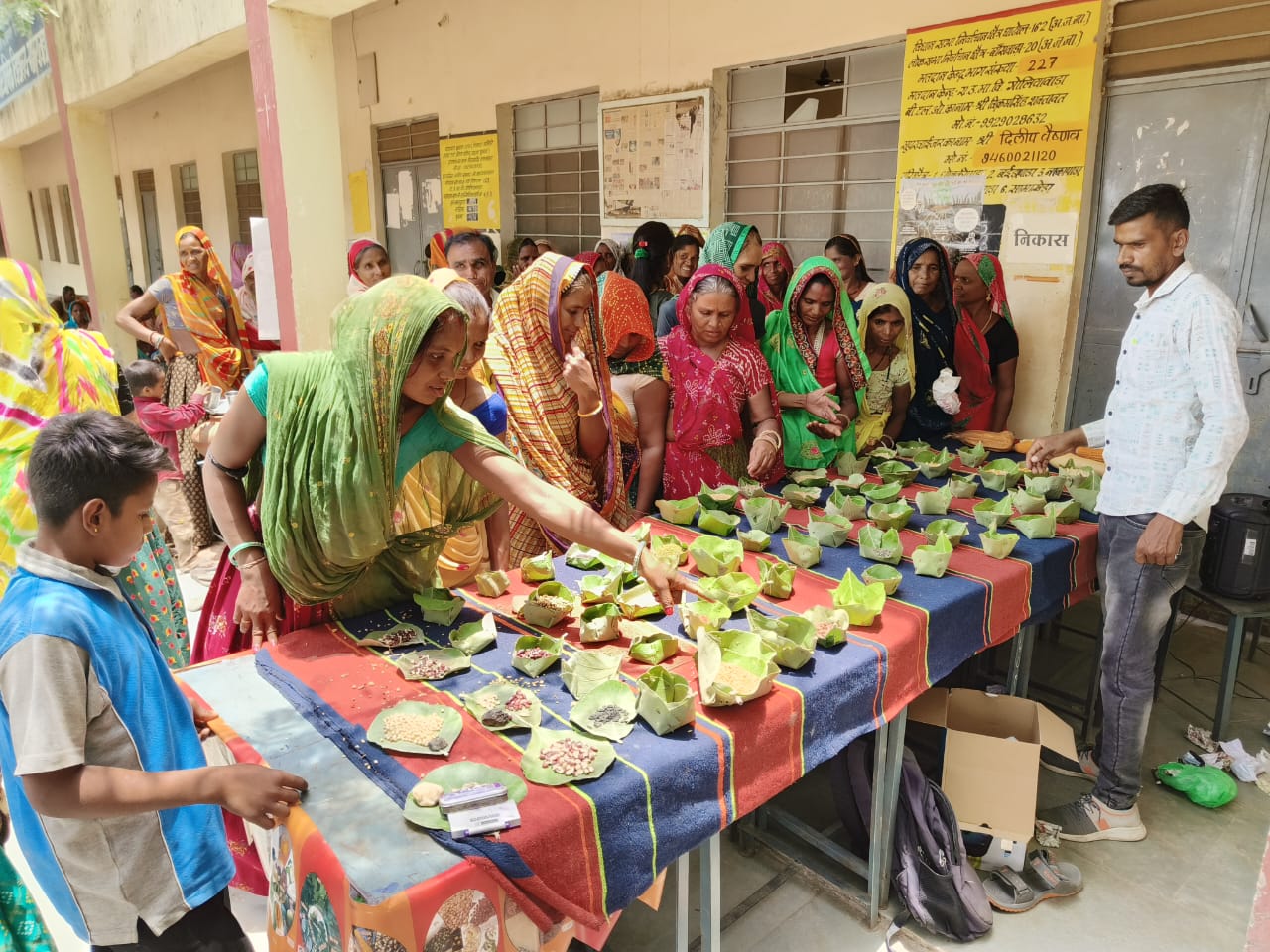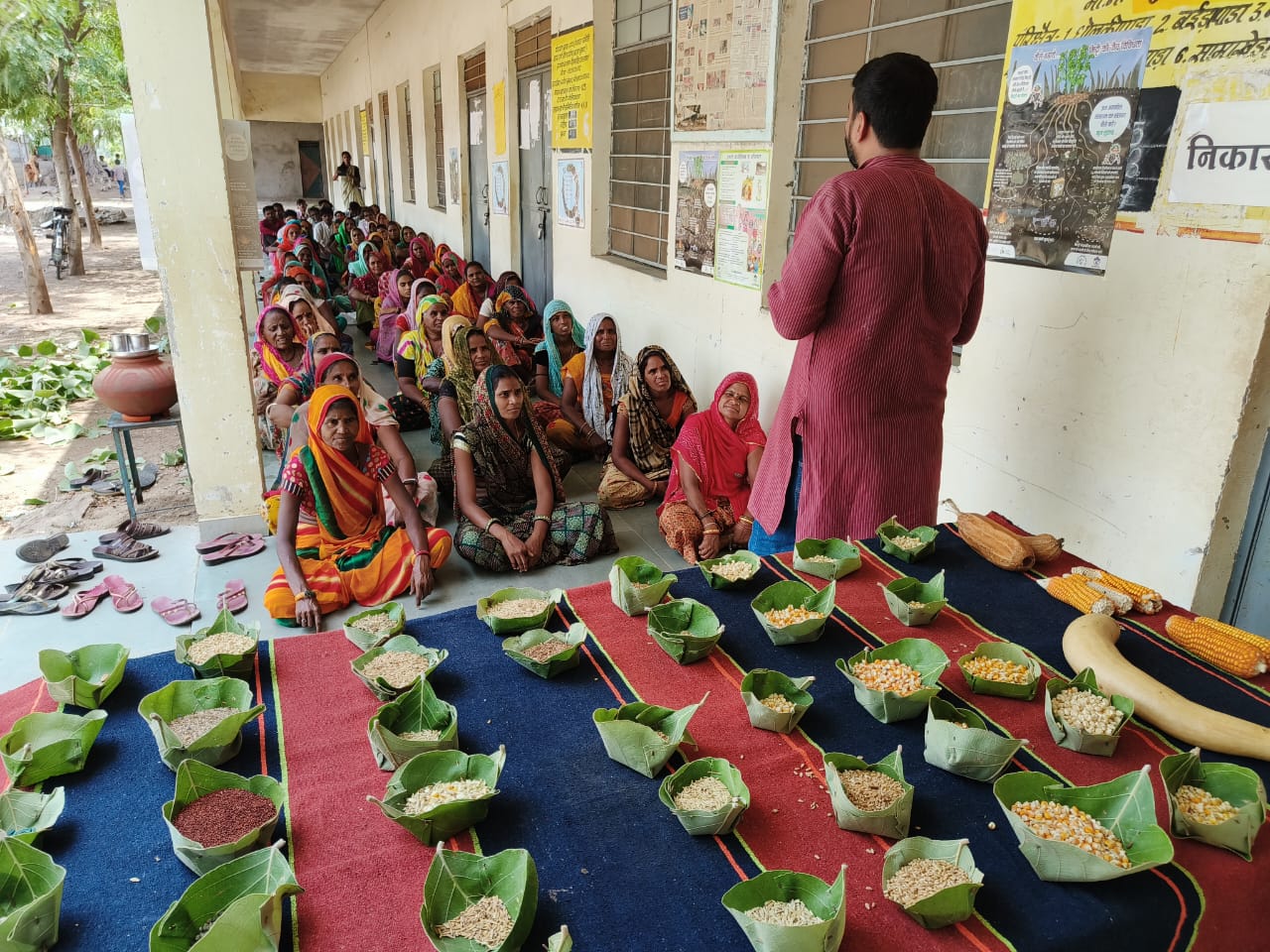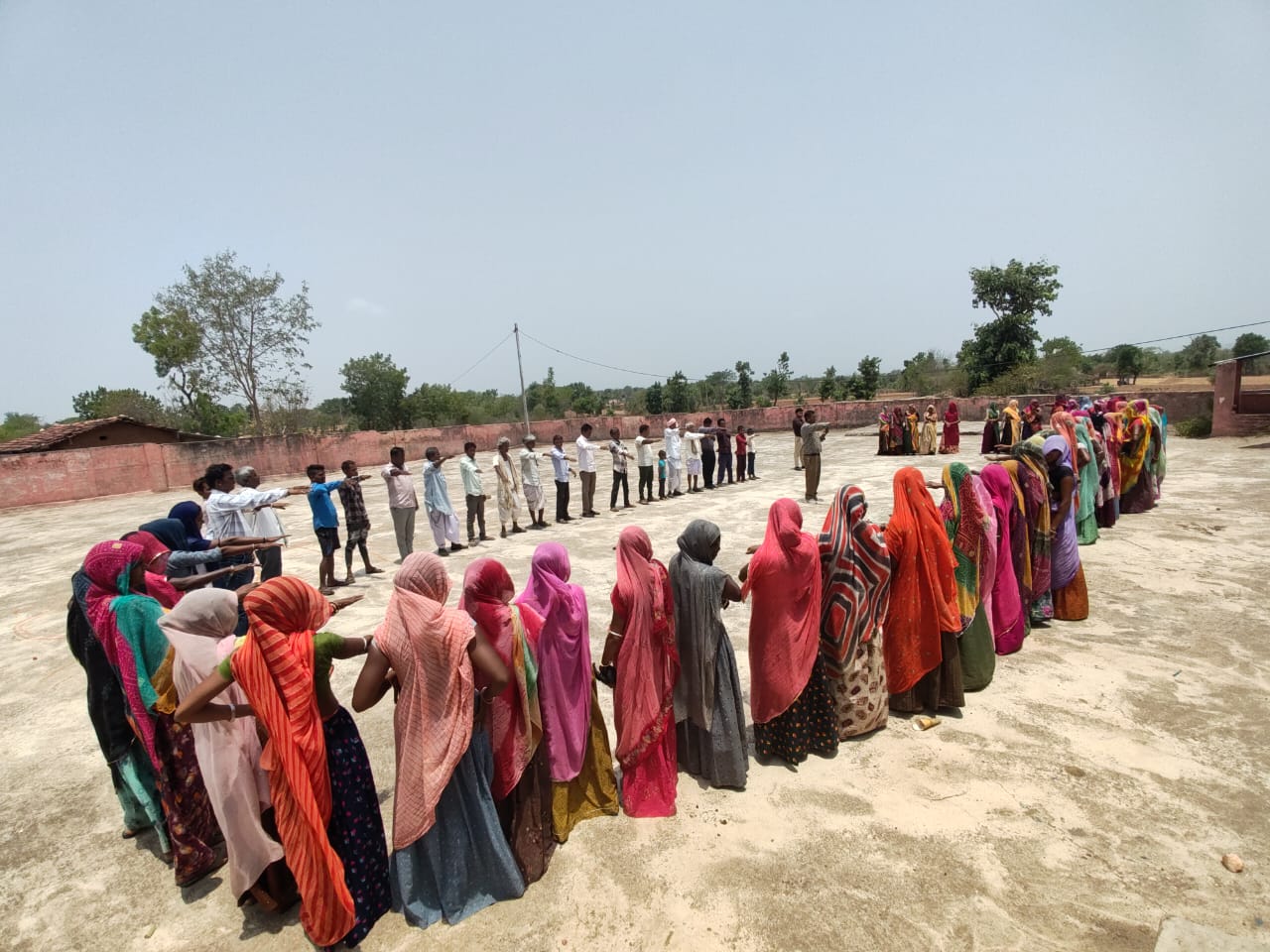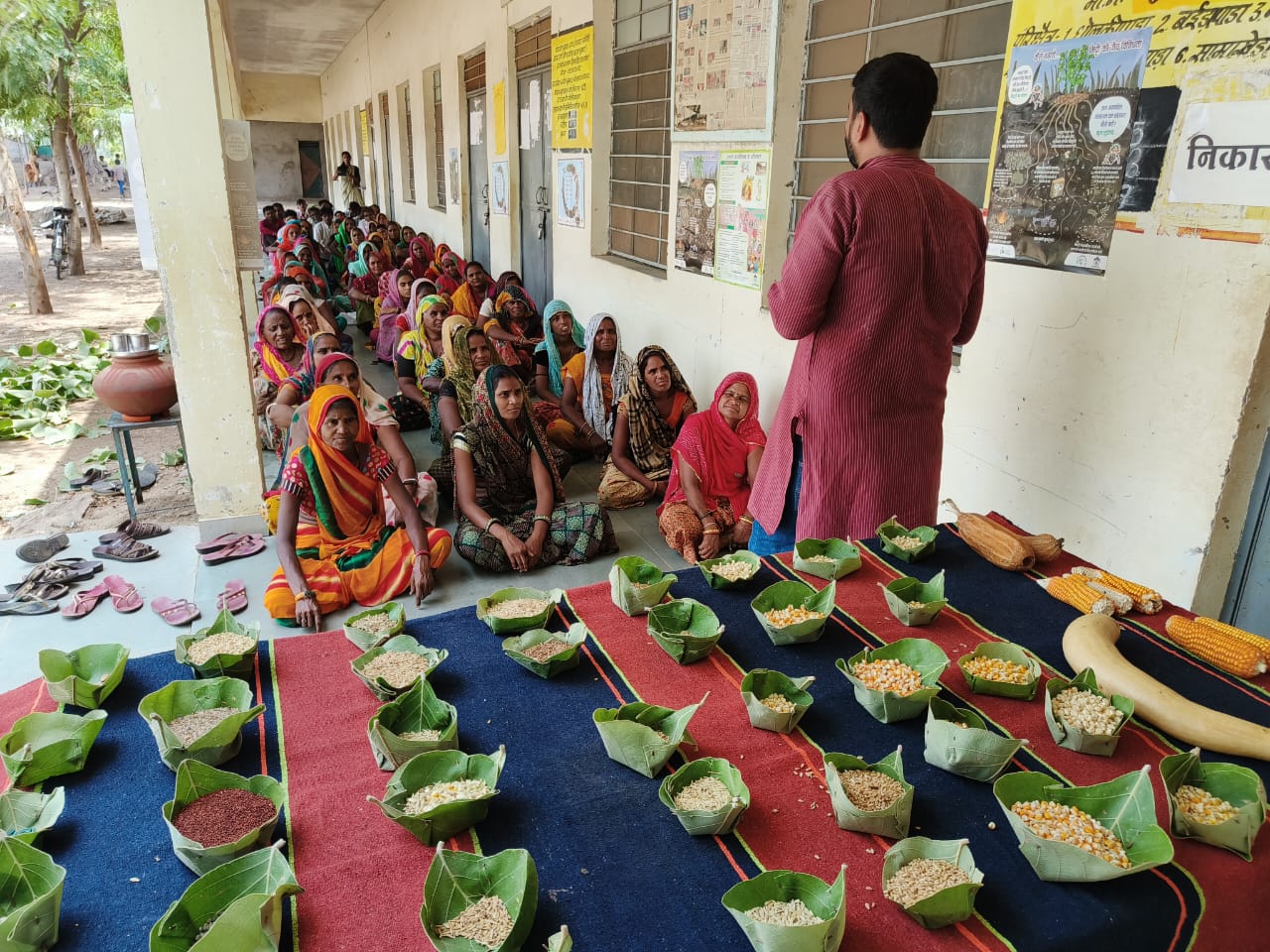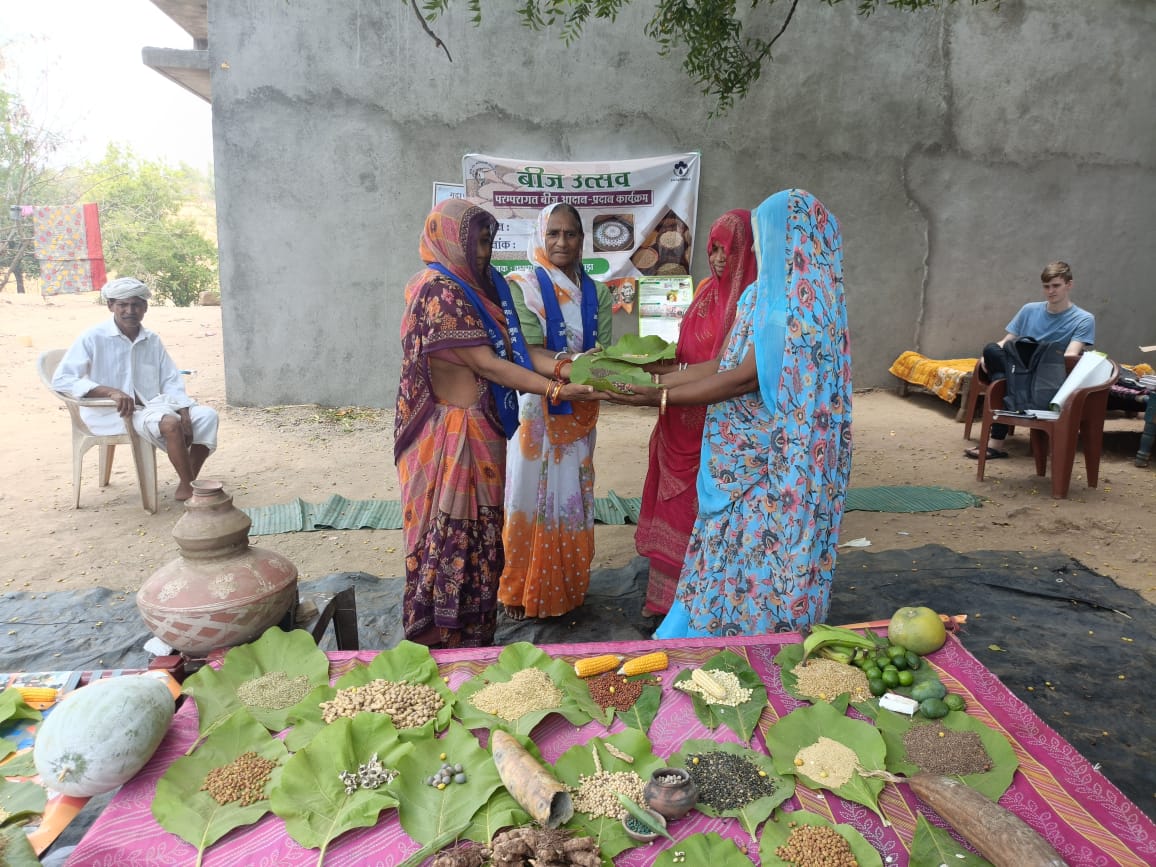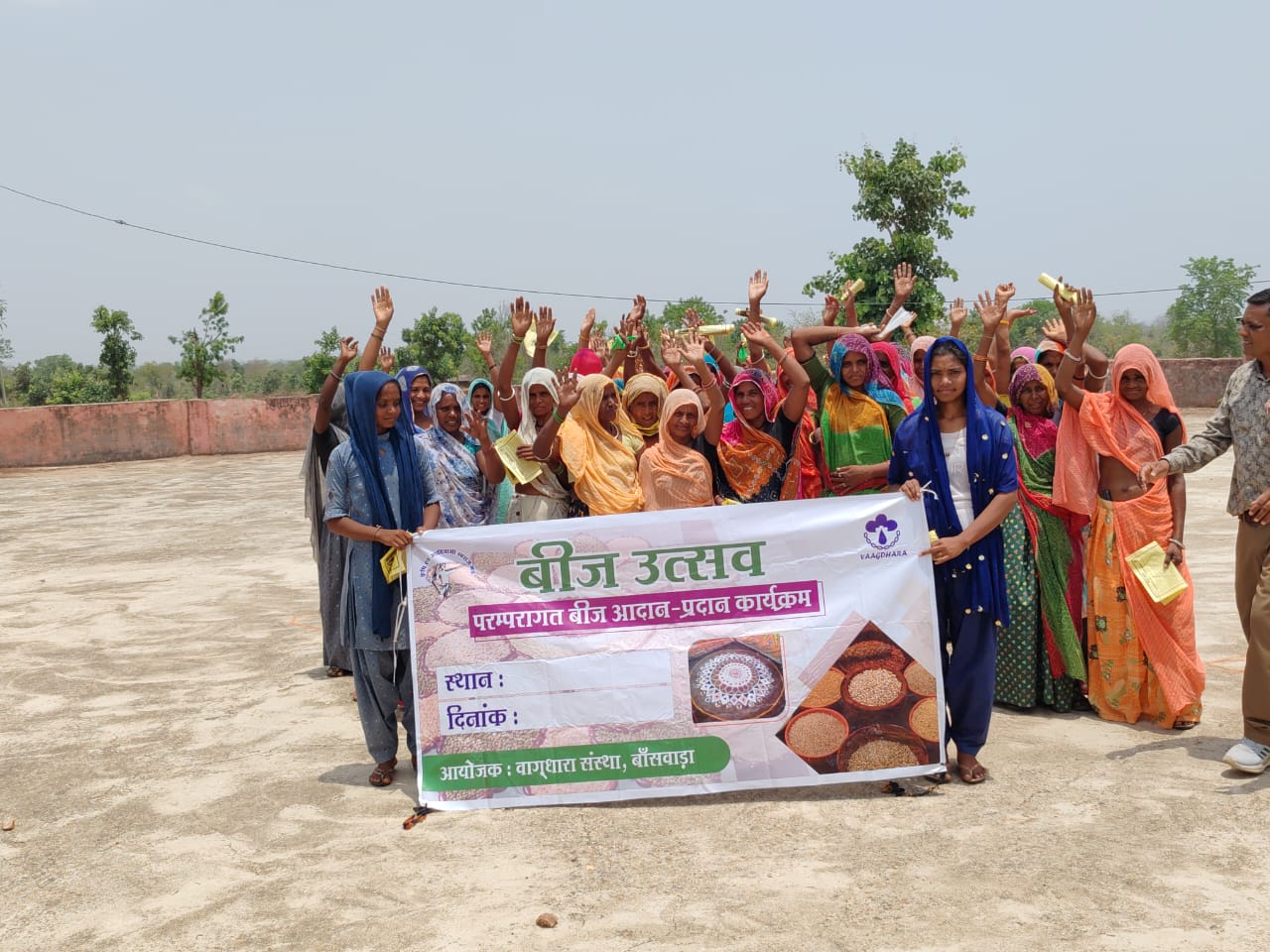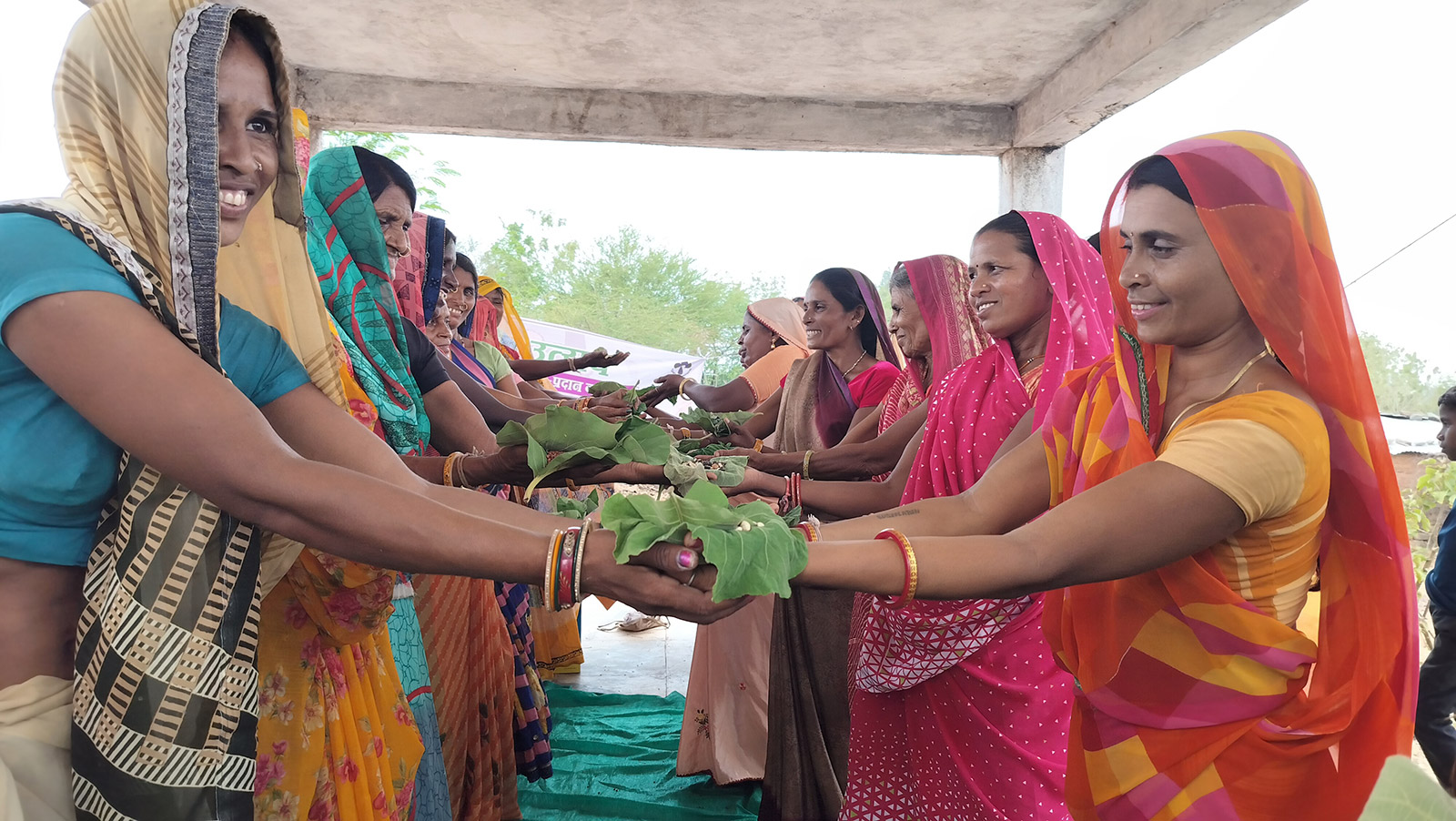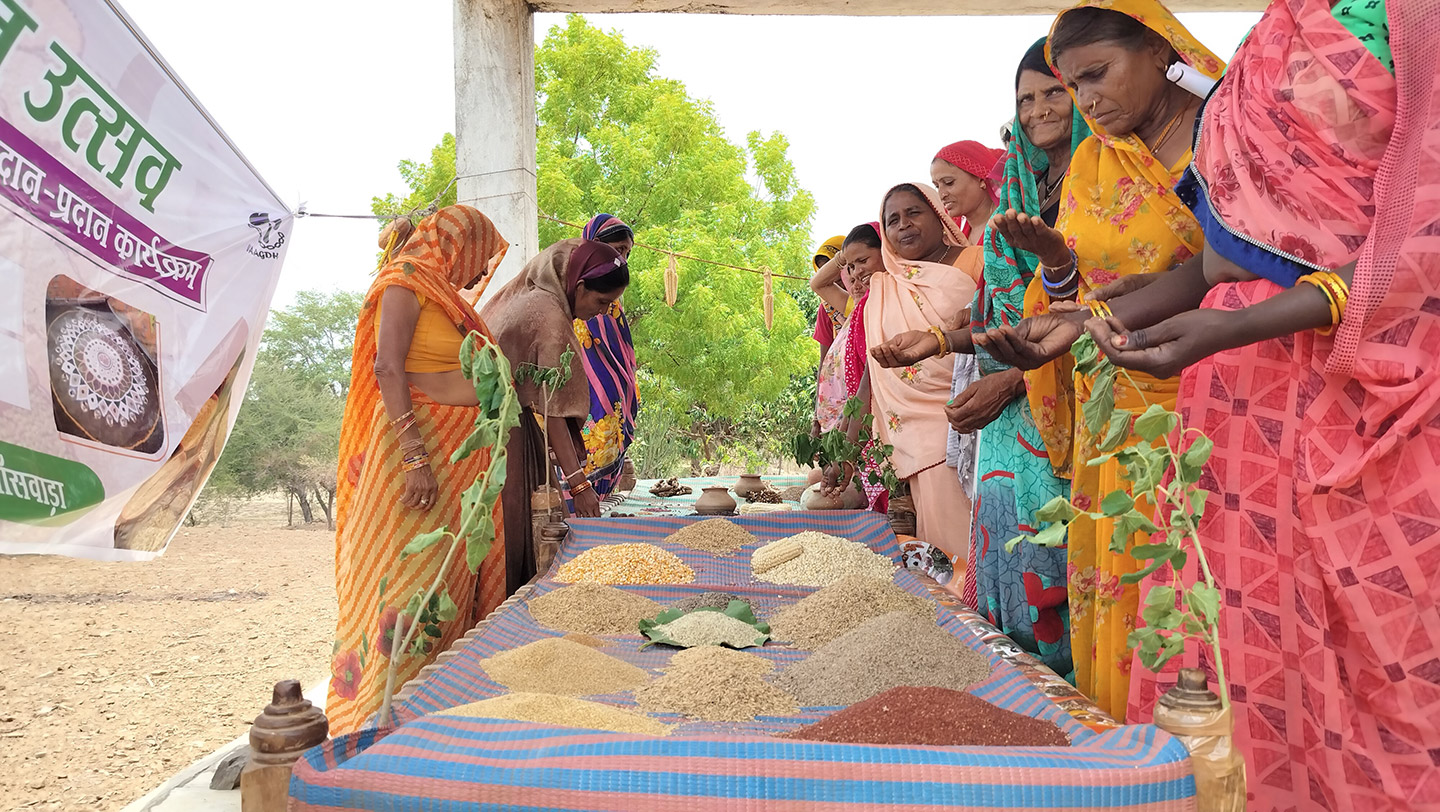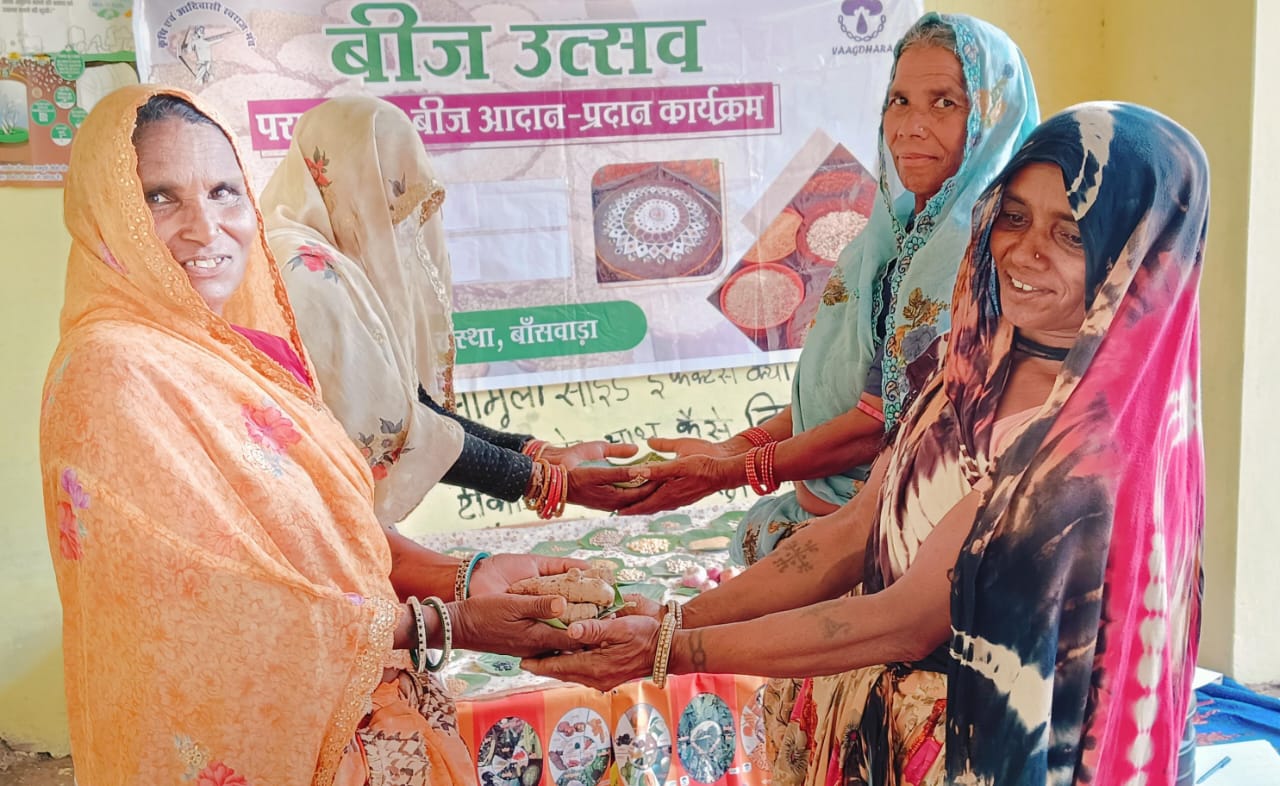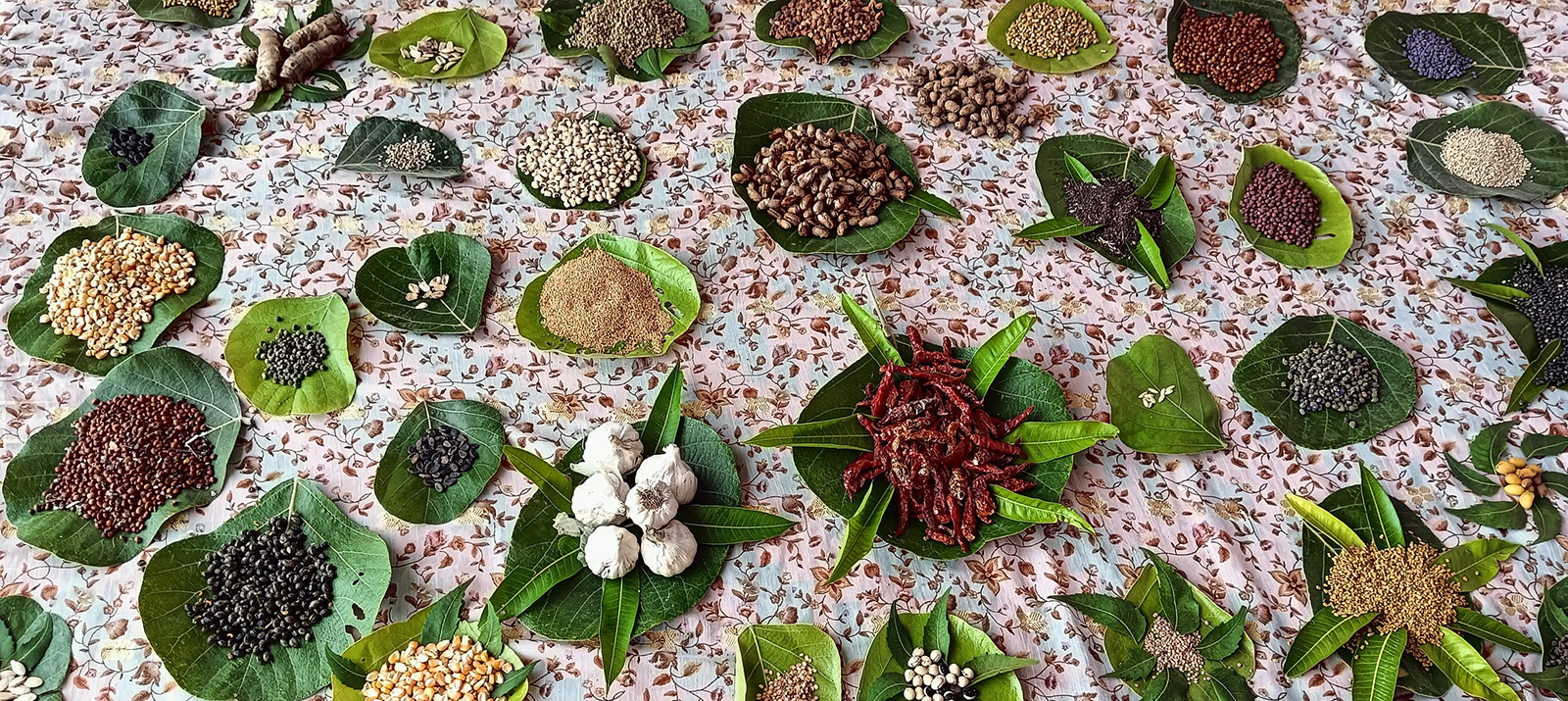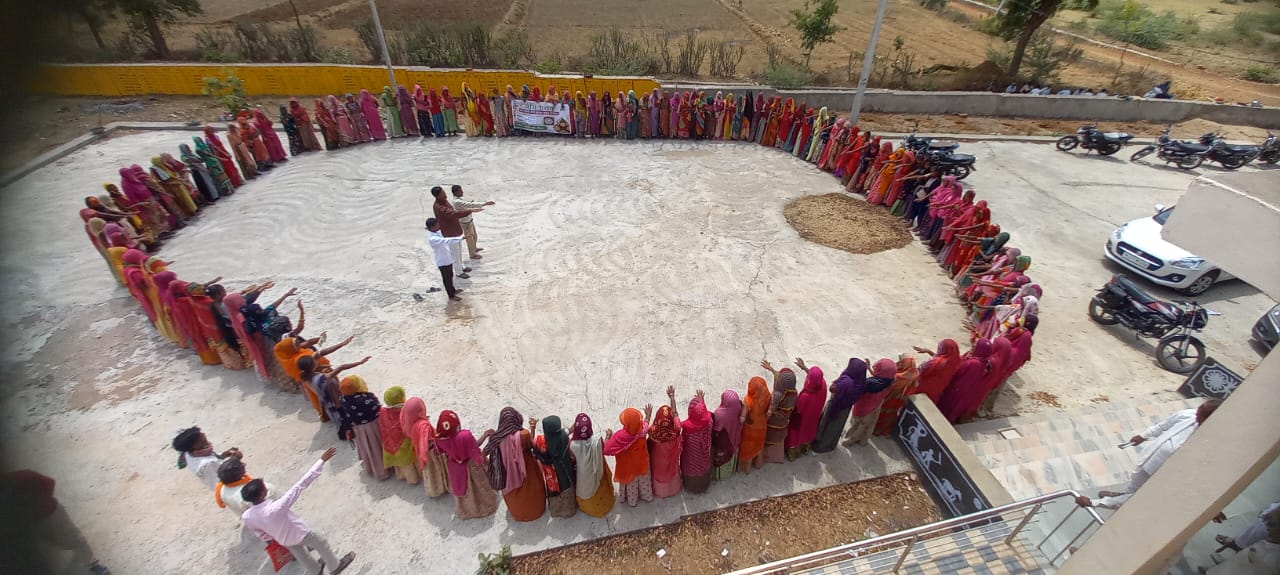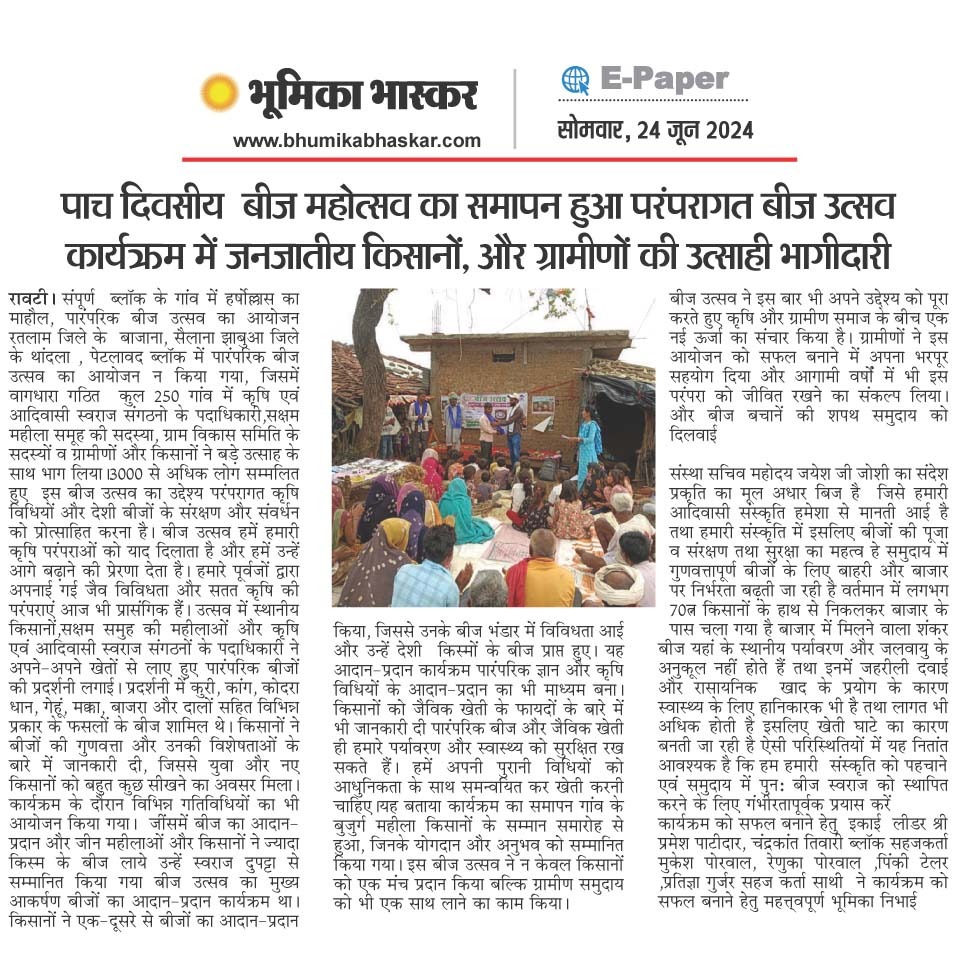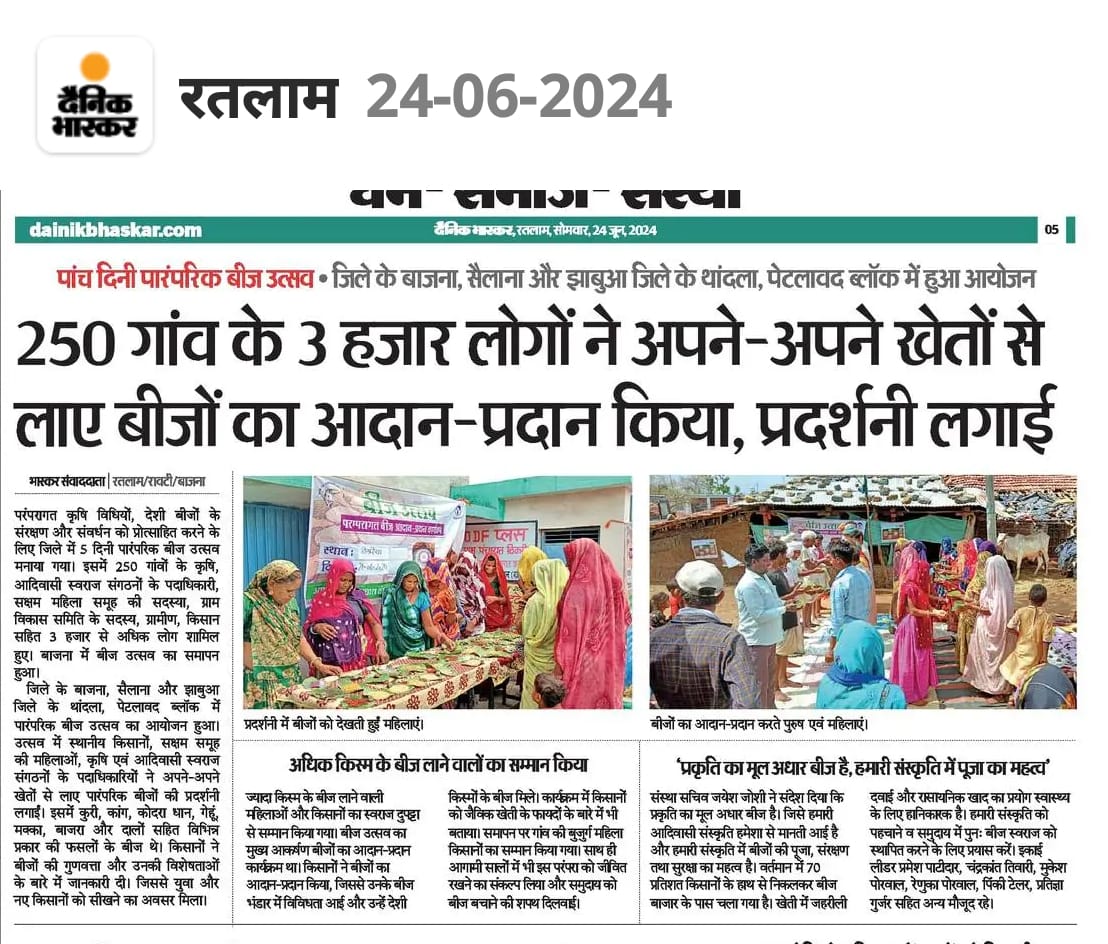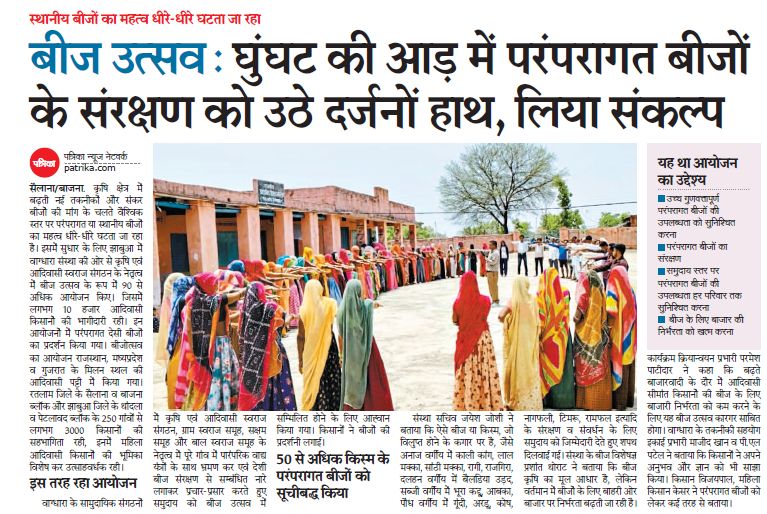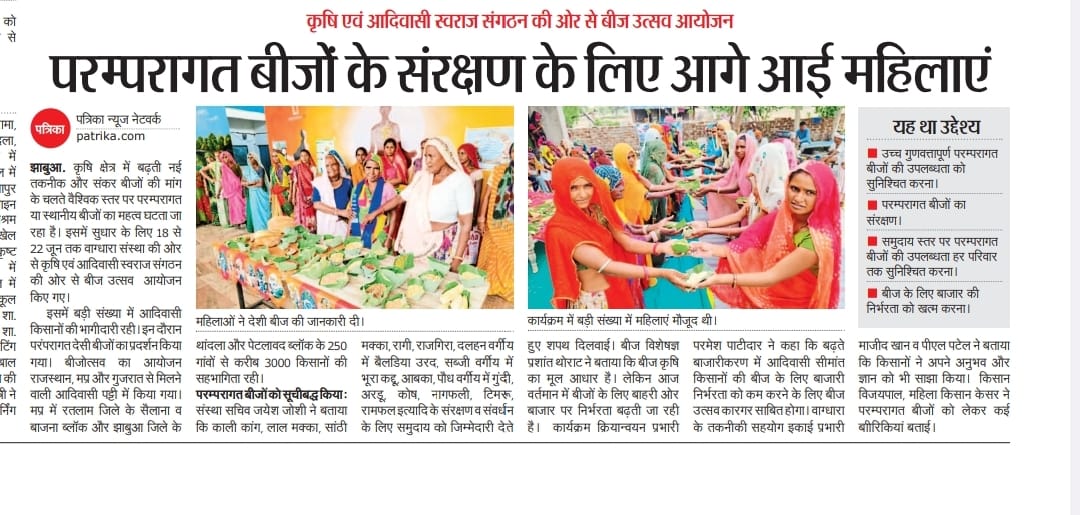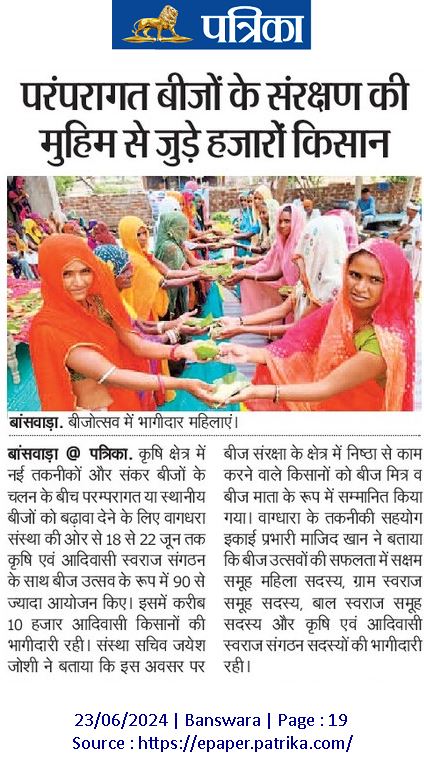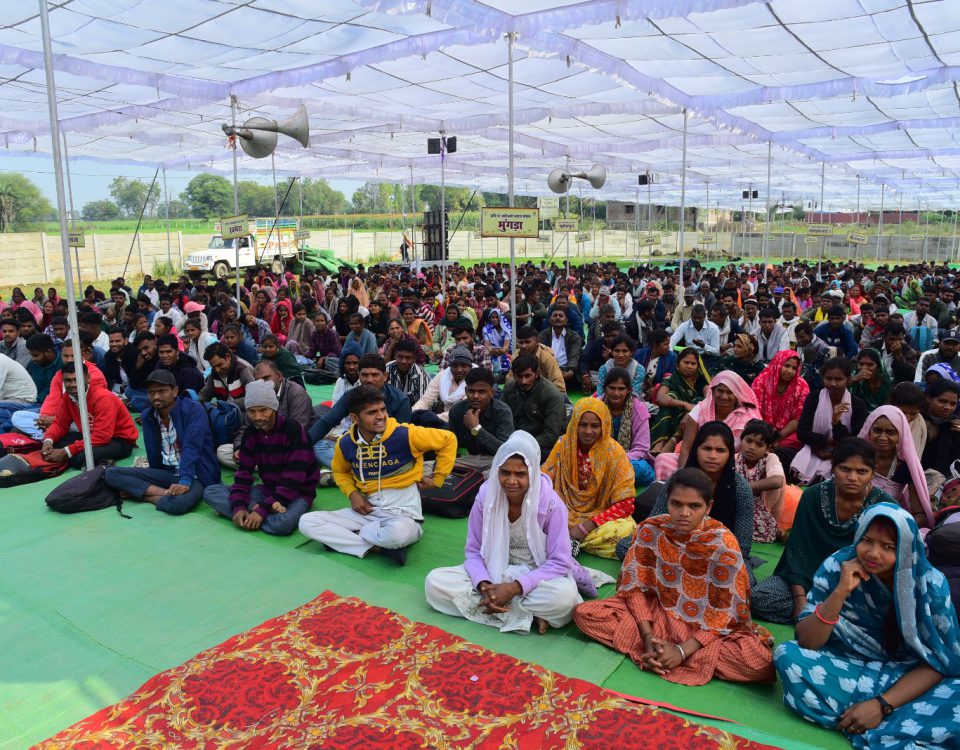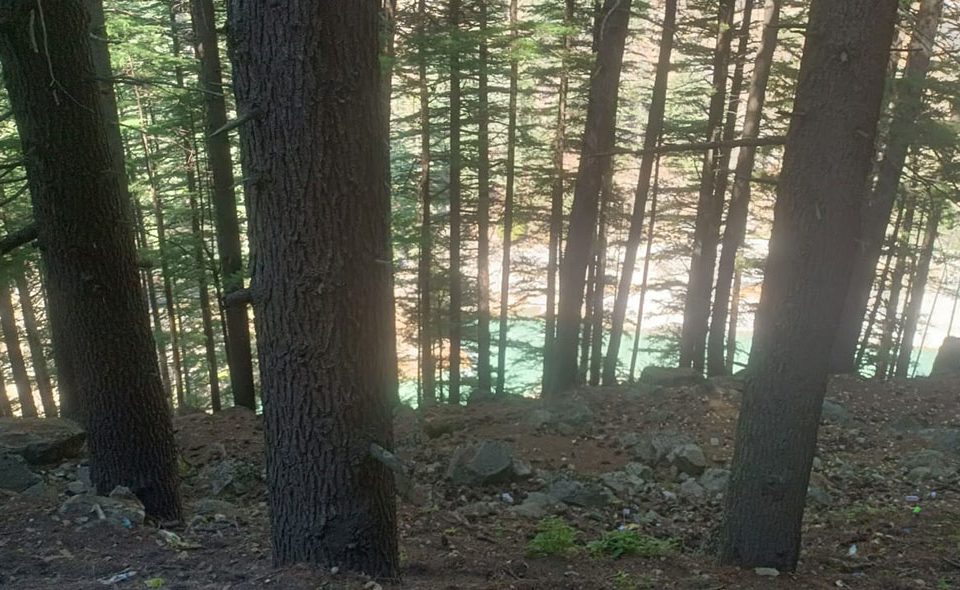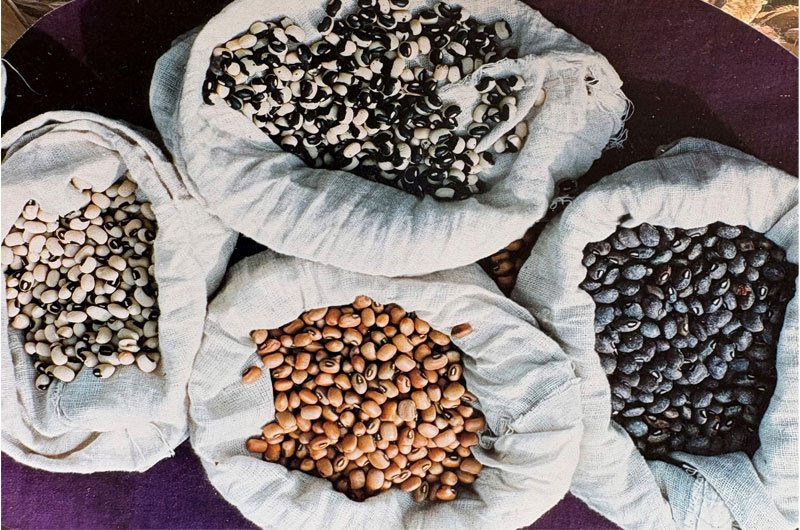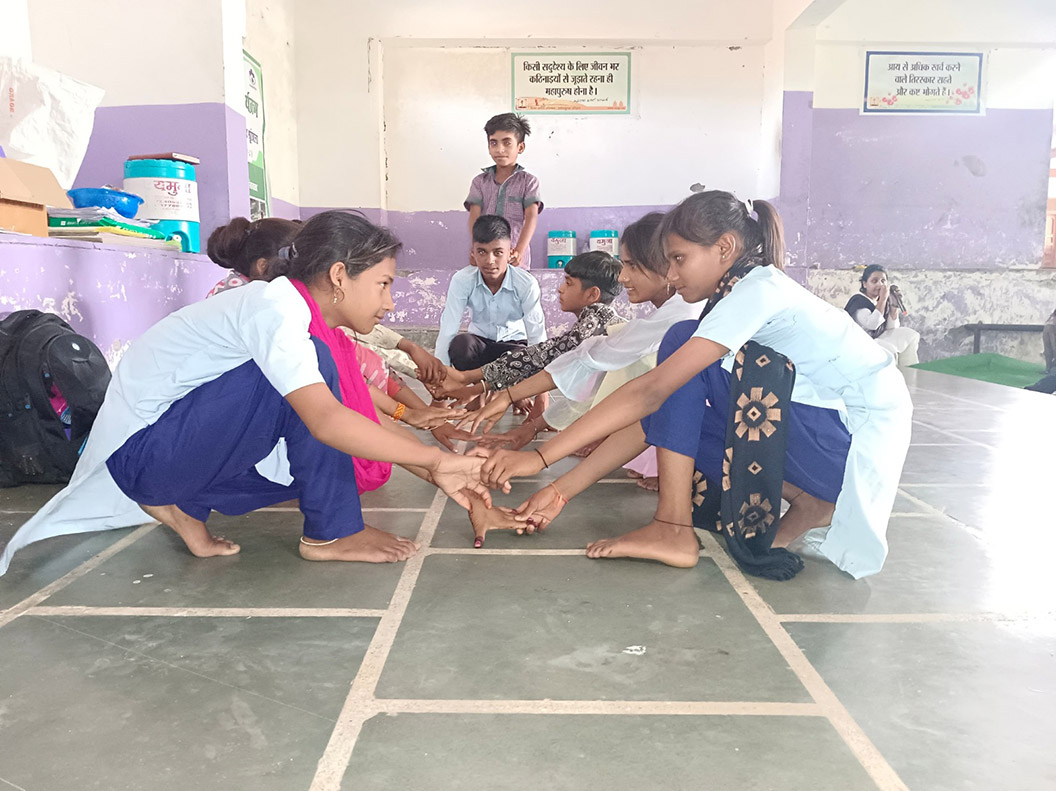
Completion of the second phase of the innovative program to develop leadership abilities of children
June 14, 2024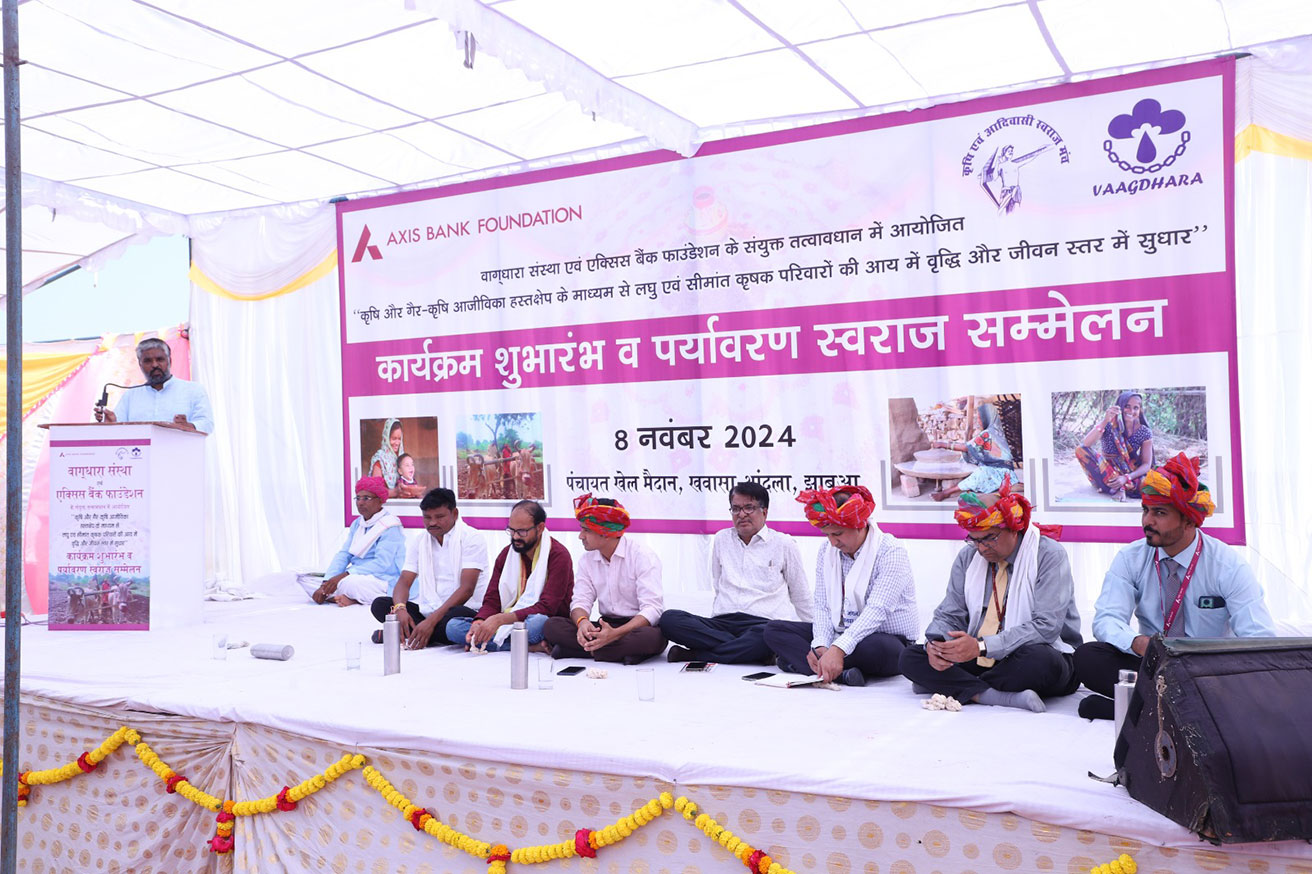
Launching of the Sustainable Livelihood Programme across 250 villages in MP
November 9, 2024Due to increasing new technologies in agriculture and the demand for hybrid seeds, the importance of traditional local seeds is gradually declining on a global scale. With the aim of improving the situation by restoring and promoting the importance of traditional seeds, Vaagdhara organised more than 90 events in the form of Seed Utsav (Seed Exchange Festival) from 18th to 22nd June 2024 under the guidance of the Agriculture and Tribal Swaraj Group in its working area, in which around 10,000 tribal farmers participated. At these events, traditional indigenous seeds were displayed and ideas about their characteristics and importance were exchanged. Beej Utsav was organised in the tribal belt of the trijunction of Rajasthan, Madhya Pradesh and Gujarat. The role of women tribal farmers was particularly encouraging.
The Seed Utsav was organised with various objectives in mind, the most important of which is to ensure the conservation and availability of high-quality traditional and climate-friendly seeds. Many seed species are endangered today, hence the Seed Utsav programme was organised which involved actions like promoting traditional seed varieties through the media, ensuring the availability of traditional seeds to every family at the community level, eliminating the market dependency of seeds, practising traditional methods of seed conservation in the community and reviving traditional agricultural practices.
The community, under the leadership of the community organisations of Vaagdhara, including the Farmers' and Adivasi Sangathan, Gram Swaraj Samuh and Bal Swaraj Groups, participated in the Seed Utsav by parading around the villages with traditional musical instruments and spreading slogans for the conservation of indigenous seeds. Farmers contributed all the seed varieties that they preserve and seed exhibitions were organised where the farmers exchanged their seeds with one another. Moreover, the discussions on traditional seeds raised awareness about their quality, their health benefits, as well as the methods and measures to preserve them.
At a time when a few multinational companies are doing their best to consolidate their dominance over the world's seed resources, events like the Beej Utsav help to protect and strengthen farmers' rights to their seeds. More than 50 varieties of traditional seeds were presented at the exhibition, including some that are threatened with extinction: Black Kang, Red Maize, Santhi Maize, Ragi, Rajgira in the cereals category; Bailadiya Urad in the pulses category; Brown Gourd, Aabka in the vegetables category; Gundi, Arudu, Kosch, Nagfali, Timru, Ramphal in the crops category. The community also took an oath to preserve and promote these varieties. The farmers who devoted themselves to the protection of seeds were given a special honour. They were honoured as Seed Mitras or Seed Mothers.
The secretary of the organisation, Jayesh Joshi, said that it is the tribal community that has preserved the heritage of its natural resources for centuries. This heritage especially includes traditional local seeds, which are of utmost importance in today's world where a few multinational companies are increasingly controlling the world's seed industry. By organising such seed festivals or seed fairs, the organisation tries to set an example for the tribal community to other communities and the outside world so that they too are inspired to preserve the local seeds in their respective areas.
This is the only way Beej Swaraj can be restored in the true sense of the word.
This Beej Utsav also has a special significance for the preparations for the Kharif harvest, as the seeds are sown with the rains. Therefore, the exchange of seeds and information is particularly important at this time in order to increase one's own chances and diversity of harvest.
As a result of all these efforts, a favourable environment for the protection of seeds in the area has been created thanks to the efforts of Vaagdhara. The farmers feel that they urgently need this work and one of the reasons for the success of the Beej Utsav is that work has been going on continuously for many years to protect these traditional seeds.
The organisation's seed expert, Prashant Thorat, informed the participants that seeds are the basis of agriculture. Whereas farmers traditionally cultivated their own seeds and were therefore sovereign, they are becoming increasingly dependent on the external seed market. Currently, around 70 per cent of seeds are no longer in the hands of farmers, but on the market. This development is particularly favoured by politics. Every year, the central and state governments spend thousands of rupees on providing hybrid seeds. This hybrid seed is not only transported over hundreds of kilometres but is mostly unsuitable for the local conditions and climate. Additionally, due to hybrid seeds and modern farming methods, the expenditure on irrigation, toxic chemicals and pesticides is continuously increasing, which results in the cost of farming rising day by day. Therefore, agriculture is becoming a loss-making business. At the same time, the availability of traditional local seeds, which are rich in nutrients and suitable for the local climate, is constantly decreasing. The youth is forgetting the culture of seed conservation, traditional seed saving and promotion. Under these circumstances, we need to recognise our seed culture and make serious efforts to restore Seed Swaraj in the community.
Parmesh Patidar, Programme Implementation Lead of Vaagdhara, remarked that in this age of increasing marketisation, this Beej Utsav will prove to be an effective means of reducing the market dependence of marginal tribal farmers on seeds as traditional seeds are a symbol of agricultural traditions and cultural heritage passed on from generation to generation. These seeds have many characteristics, e.g. they are adapted to the local climate and soil, which means they produce higher yields and require less care, promote biodiversity and help maintain ecological balance. In addition, plants grown from traditional seeds are rich in health-promoting elements. It is therefore important to preserve traditional indigenous seeds so that we can offer future generations a better tomorrow.
Majid Khan, Lead of Vaagdhara Technical Support Unit, said that active participation of local farmers, members of the Saksham Samooh, members of the Gram Sawaraj Samooh, members of Bal Swaraj Samooh and members of Krish Evam Adivasi Swaraj Sangthan was ensured to make the Beej Utsav programme successful. The children were not only educated about the importance of traditional seeds but were also allowed to share their experiences and knowledge. To preserve traditional seeds, the programme focused on setting up seed banks in the communities to safely store the traditional seeds brought by the farmers. This way, the seeds of the future can be preserved and nurtured.
The villagers are very enthusiastic about the Beej Utsav. According to farmer Vjiaypal, there is now a platform for everything the community wants to know and do to protect indigenous seeds. Now they will also involve the youth and take this work forward. Other farmers, especially women, felt that such seed festivals should be organised every year. A farmer named Kesar shared that she had brought many types of seeds and is taking home a variety of new seeds. We all benefit from such an exchange.
One reason for the success of the Beej Utsav is that Vaagdhara has been working to protect traditional seeds for many years. Many marches have been undertaken to raise awareness on the importance of the traditional seed varieties, training sessions have been organised on how to continue this seed protection and efforts have been made in various villages to save community seeds.
Government officials and employees of the Ministry of Agriculture, elected representatives of the Panchayat and colleagues from other institutions were also united at the Beej Utsav. This way, it became a broad-based effort and received the support of all.
To conclude, here are the words of PL Patel, a senior partner of the organisation: "We hope that such Beej Utsav will continue to be organised successfully in the future as they bring great benefits to all.
एक बेहतर कल के लिए परम्परागत बीजों के संरक्षण हेतु उठे हजारों हाथ
वर्तमान समय में कृषि क्षेत्र में बढ़ती हुई नई तकनीकों और संकर बीजों की मांग के चलते वैश्विक स्तर पर परम्परागत या स्थानीय बीजों का महत्व धीरे-धीरे घटता जा रहा है। इस स्थिति को सुधारने और परम्परागत बीजों की महत्ता को पुनः स्थापित व बढ़ावा देने के उद्देश्य से दिनांक 18 से 22 जून तक वाग्धारा संस्था ने अपने कार्य क्षेत्र में कृषि एवं आदिवासी स्वराज संगठन के नेतृत्व में बीज उत्सव के रूप में 90 से अधिक आयोजन किए, जिसमें लगभग 10 हजार आदिवासी किसानों की भागीदारी रही। इन आयोजनों में परंपरागत देसी बीजो का प्रदर्शन किया गया व इनके गुणों व महत्त्व के बारे में विचारो का आदान-प्रदान किया गया। बीजोत्सव का आयोजन राजस्थान, मध्यप्रदेश व गुजरात के मिलन स्थल की आदिवासी पट्टी में किया गया। इनमें महिला आदिवासी किसानों की भूमिका विशेष कर उत्साहवर्धक रही।
बीज उत्सव का आयोजन विभिन्न उद्देश्यों को ध्यान में रखते हुए किया गया , जिनमें मुख्यतः उच्च गुणवत्तापूर्ण परम्परागत बीजों की उपलब्धता को सुनिश्चित करना, परम्परागत बीजों का संरक्षण “जलवायु के अनुकूल परम्परागत बीजों की कई प्रजातियां आज विलुप्त होने के कगार पर है इसलिए बीज उत्सव कार्यक्रम के माध्यम से इन बीजों को बचाना और बढ़ावा देना, समुदाय स्तर पर परम्परागत बीजों की उपलब्धता हर परिवार तक सुनिश्चित कर बीज के लिए बाजार की निर्भरता को खत्म करना, समुदाय में बीज संरक्षण के पारम्परिक तरीकों और कृषि पद्धतियों को पुनर्जीवित करना, इत्यादि रहे ।
वाग्धारा के सामुदायिक संगठनों जिनमें कृषि एवं आदिवासी स्वराज संगठन, ग्राम स्वराज समूह, सक्षम समूह और बाल स्वराज समूह के नेतृत्व में पुरे गाँव में पारंपरिक वाद्य यंत्रो के साथ भ्रमण कर एवं देशी बीज संरक्षण से सम्बंधित नारे लगाकर प्रचार-प्रसार करते हुए समुदाय को बीज उत्सव में सम्मिलित होने के लिए आह्वान किया गया । किसान जितने किस्म के बीजों का संरक्षण कर रहे है उनको साथ में लेकर आये और बीजों की प्रदर्शनी लगायी गई । विभिन्न किसानों ने उक्त बीजों को अन्य किसानों के साथ आदान प्रदान किए। साथ ही संवाद के माध्यम से परंपरागत बीजों की गुणवत्ता के बारे में भी सभी को अवगत करवाया गया, कि कैसे हमारे परम्परागत बीज, हमारे जीवन के मुख्य आधार स्तंभ थे, जो हमारे स्वास्थ्य को अनुकूल रखते थे, हमें अनेकों प्रकार की बीमारियों से दूर रखते थे एवं मृदा स्वास्थ्य को भी बढ़ाते थे, इसी के साथ में बीजों के महत्त्व और संरक्षण से सम्बंधित तरीको व उपायों पर संवाद स्थापित किया गया।
एक ऐसे समय में जब चंद बहुराष्ट्रीय कंपनिया विश्व के बीज संसाधनों पर अपना अधिपत्य जमाने का भरपूर प्रयास कर रही है, उस समय ऐसे आयोजनों से किसानो के बीज अधिकारों की रक्षा करने में व उन्हें मजबूती देने में सहायता मिलती है। प्रदर्शनी में लाएं गए 50 से अधिक किस्म के परम्परागत बीजों को सूचीबद्ध भी किया गया, साथ ही ऐसे बीज या किस्म जो विलुप्त होने के कगार पर है, जैसे अनाज वर्गीय में काली कांग, लाल मक्का, सांठी मक्का, रागी, राजगिरा, दलहन वर्गीय में बैलडिया उरद, सब्जी वर्गीय में भूरा कद्दू, आबका, पौध वर्गीय में गुंदी, अरडू, कोष, नागफली, टिमरू, रामफल इत्यादि के संरक्षण व संवर्धन के लिए समुदाय को जिम्मेदारी देते हुए शपथ दिलवाई गई। अनेक गाँवो में ऐसे किसान प्रोत्साहित किए गए जिन्होंने बीज रक्षा का कार्य गहरी निष्ठा से किया, ऐसे किसानो को बीज मित्र व बीज माता के रूप में सम्मानित भी किया गया।
संस्था सचिव जयेश जोशी ने बताया कि सदियों से अपने प्राकृतिक संसाधनों की विरासत को सहेज कर रखने वाला हमारा आदिवासी समुदाय ही है, और बीज भी एक महत्त्वपूर्ण विरासत है, जिसकों इस मौजूदा विश्व के बीज उद्योग में चंद बहुराष्ट्रीय कंपनियों के बढ़ते नियंत्रण के दौर में भी आदिवासी समुदाय ने सहेज कर रखा हुआ है। इस तरह के बीजोत्सव या बीज मेलों के आयोजन द्वारा संस्था की यह कोशिश है की कैसे आदिवासी समुदाय को अन्य समुदाय एवं बाहरी दुनिया के सामने एक उदाहरण के रूप में पेश कर पाएं, ताकि वह भी अपने अपने क्षेत्र में स्थानीय बीजों के संरक्षण के लिए प्रेरित हो सके। तभी सही मायनों में बीज स्वराज को पुर्नस्थापित किया जा सकता है।
इस बीजोत्सव का विशेष महत्त्व इस समय खरीफ की फसल की तैयारियों के सम्बन्ध में भी है। इस समय बीजों के आदान-प्रदान का विशेष महत्त्व है। वर्षा आने से पहले विभिन्न फलदार व अन्य वृक्षों से सम्बंधित जानकारी का आदान-प्रदान भी महत्वपूर्ण है।
उन सभी प्रयासों के फलस्वरूप वाग्धारा संस्था के प्रयासो से क्षेत्र में बीजो की रक्षा के लिए अनुकूल माहोल तैयार हो गया। किसानो को लगा की यह तो वही कार्य है जिसकी उन्हें बहुत जरुरत है व बीजोत्सव की सफलता का एक कारण यह भी है, की इन परंपरागत बीज रक्षा के लिए निरन्तरता से कार्य हुआ है।
संस्था के बीज विशेषज्ञ प्रशांत थोराट ने सहभागियों को जानकारी देते हुए बताया की बीज कृषि का मूल आधार है, लेकिन आज वर्तमान में बीजो के लिए बाहरी ओर बाजार पर निर्भरता बढ़ती जा रही है। वर्तमान में लगभग 70 प्रतिशत बीज किसानो के हाथ से निकलकर बाजार के पास चला गया है। हर वर्ष केन्द्र व राज्य सरकार हजारों-करोड़ रूपये संकर बीजों की उपलब्धता पर खर्च कर रही है । ये संकर बीज भी सैकड़ों किलोमीटर की दुरी से आते है जो स्थानीय पर्यावरण और जलवायु के अनुकूल नहीं होते है। दूसरी ओर संकर बीज एवं आधुनिक कृषि पद्धतियों के कारण सिंचाई, जहरीले रसायन और कीटनाशको पर होने वाला खर्च भी लगातार बढ़ता जा रहा है, जिससे खेती की लागत भी दिन-प्रतिदिन बढती जा रही है। इसलिये खेती घाटे का सौदा बनती जा रही है। हमारे परंपरागत बीज जो पोषण से भरपूर है एवं स्थानीय जलवायु के अनुकूल है उनकी उपलब्धता लगातार कम होती जा रही है। समुदाय का युवा वर्ग परंपरागत रूप से बीजों को सहेजने और संवर्धन की हमारी बीज संरक्षण की संस्कृति को भूलते जा रहे है। ऐसी परिस्थितयों में यह नितांत आवश्यक है कि हम हमारी बीज संस्कृति को पहचाने एवं समुदाय में पुनः बीज स्वराज को स्थापित करने के लिए गंभीरतापूर्वक प्रयास करने की आवश्यकता पर सोच विचार करें ।
संस्था के कार्यक्रम क्रियान्वयन प्रभारी परमेश पाटीदार ने कहा कि बढ़ते बाजारीकरण के दौर में आदिवासी सीमांत किसानों की बीज के लिए बाजारी निर्भरता को कम करने के लिए यह बीज उत्सव कारगर साबित होगा । क्यूंकि परंपरागत बीज पीढ़ी दर पीढ़ी कृषि परंपराओं और सांस्कृतिक धरोहर का प्रतीक होते हैं। इन बीजों की कई विशेषताएँ होती हैं, जैसे परंपरागत बीज स्थानीय जलवायु और मिट्टी के अनुसार ढले हुए होते हैं, जिससे इनकी पैदावार अधिक होती है और इन्हें कम देखभाल की आवश्यकता होती है। यह बीज जैव विविधता को बढ़ावा देते हैं और पर्यावरण संतुलन बनाए रखने में मदद करते हैं। परंपरागत बीजों से उत्पन्न फसलें पोषक तत्वों से भरपूर होती हैं, जो स्वास्थ्य के लिए लाभकारी होती हैं। इसलिए परंपरागत देशी बीजों को बचाना आवश्यक है ताकी हम आने वाली पीढ़ी को बेहतर कल दे सकें ।
वाग्धारा के तकनीकी सहयोग इकाई प्रभारी माजीद खान ने बताया की उक्त बीज उत्सव कार्यक्रम को सफल बनाने में स्थानीय किसान, सक्षम समुह महिला सदस्य, ग्राम स्वराज समूह सदस्य, बाल स्वराज समूह सदस्य और कृषि एवं आदिवासी स्वराज संगठन सदस्यों की सक्रीय भागीदारी सुनिश्चित की गई। उन्हें न केवल परंपरागत बीजों के महत्व के बारे में बताया गया, बल्कि उन्हें अपने अनुभव और ज्ञान को भी साँझा करने का मौका मिला। परंपरागत बीजों के संरक्षण के लिए किसानों द्वारा लाए गए परंपरागत बीजों को सुरक्षित रखने के लिए सामुदायिक बीज बैंक की स्थापना पर बल दिया गया। ताकि भविष्य में बीजों का संरक्षण और संवर्धन किया जा सके ।
इस बीजोत्सव से ग्रामवासी बहुत उत्साहित है। किसान विजयपाल ने कहा कि देशी बीजो की रक्षा के बारे में हम जो कहना व करना चाहते थे, हमें उसके लिए मंच मिल गया है। अब हम इसमें युवाओं को भी जोड़ेंगे और इस कार्य को आगे ले जायेंगे। अन्य किसानो विशेषकर महिला किसानो ने भी कहा की ऐसे बीजोत्सव का आयोजन प्रतिवर्ष होना चाहिए।
केसर नामक महिला किसान ने कहा की वे अनेक तरह के बीज अपने साथ ले कर आई थी व कुछ अन्य बीजो को अपने साथ ले जा रही है। ऐसे आदान प्रदान से हम सभी की भलाई है।
इस बीज उत्सव की सफलता का एक कारण यह है की वाग्धारा ने अनेक वर्षो से परंपरागत बीजो की रक्षा के लिए प्रयास किये है। इस तरह का महत्त्व समझाते हुए अनेक पद यात्राए निकली गई। इस बीज रक्षा को कैसे आगे ले जाये इसके लिए प्रशिक्षण दिया गया। विभिन्न गाँवो में सामुदायिक बीज को सहेज कर रखने के प्रयास स्थापित किए गए।
बीजोत्सव में कृषि विभाग, उद्यान विभाग के सरकारी अधिकारियो व कर्मचारियो, पंचायत के निर्वाचित प्रतिनिधियो को, अन्य संस्थाओ के साथियों को भी आमन्त्रित किया गया। इस तरह यह व्यापक प्रयास बन गया व सभी का सहयोग प्राप्त हुआ। विभिन्न गांव स्तर के आयोजनो के बाद उपस्थित गांव वासियों ने स्थानीय परंपरागत बीजो की रक्षा करने की शपथ भी ली।
संस्था के वरिष्ठ साथी पी.एल पटेल ने कहा- हम उम्मीद करते है की आगे भी ऐसे बीज रक्षा उत्सवो का सफल आयोजन होता रहेगा।
Subscribe to our newsletter!


